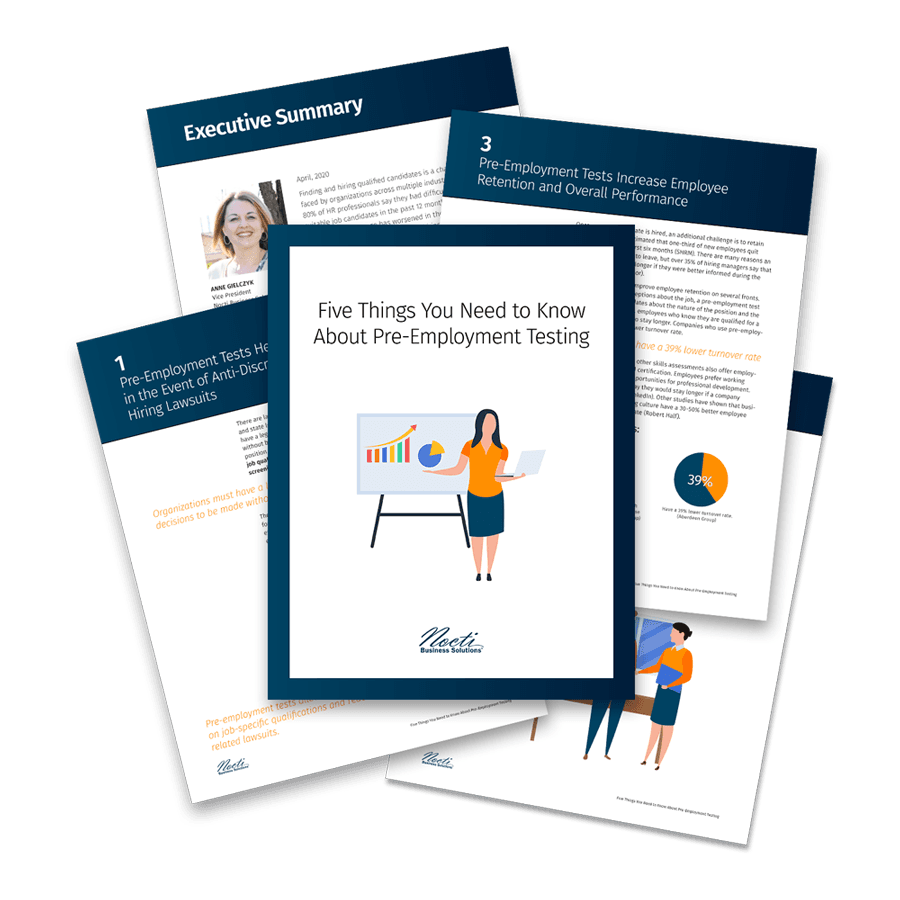By now, we’re used to hearing about the various ways the pandemic has changed the world. In our previous post, we discussed how COVID-19 has impacted hiring and how pre-employment tests can help employers meet various recruiting challenges. The way we think about skills and the value of those skills in a post-pandemic workforce is also changing rapidly.
Quickly becoming one of the most valuable commodities in the job market, skills (and ways to validate those skills) will be an integral part of building a competent and dynamic workforce. Here are three trends employers cannot afford to ignore as they prepare their workforces for future success.
1. New Skills On The Horizon
As businesses adopt new technology and processes, the skills needed for success in the workplace will also change. While change is expected, the pandemic has drastically accelerated this cycle. According to an analysis from Gartner, the number of skills required for a single job is increasing by 10% year-over-year. And only 16% of new hires have the skills needed for current jobs and jobs of the future. Existing roles may require up to 10 new skills by 2021. Skills are becoming obsolete at a faster rate than ever before, while new skills are not as well understood or defined—especially for businesses incorporating automation and artificial intelligence (AI). Because these technologies are augmenting human workers (and not replacing them) everyone from technicians and operators on the factory floor will need new sets of technical skills in order to work cohesively with robotic counterparts.
2. Evolving Employability Skills
Employability skills are the core skills needed in nearly every job. Most employability skills are “soft skills” or non-technical skills like communication, collaboration, and critical thinking. However, some “hard skills” like computer and digital literacy skills are now necessary in most workplaces. The last year has demonstrated how creativity, problem-solving, resiliency, and the ability to learn will be important as we continue making adjustments to how we work and do business.
Creativity & Problem Solving
Shifting business models and constantly changing safety measures means employees must be ready to find creative solutions to unforeseen problems. The pandemic had all of us solving problems that didn’t exist just six months before. Finding the best solution for your business or industry will require employees who are able to think creatively (and critically) about a situation and solve problems using available resources.
Resiliency & Ability to Learn
“Resiliency” describes a certain toughness and tenacity. Employees who can adjust to change and maintain their level of job performance will be valuable assets to any company. Overcoming these challenges will also require an ability to quickly learn and apply new skills.
In the early months of the COVID-19 pandemic, manufacturers around the country used what resources they had to begin making much-needed medical supplies like masks and ventilators. Not only did factory floors and equipment need to be repurposed, but employees were retrained and reskilled for their new roles.
3. Technical Skills Are More Important Than Ever
Even before COVID-19, many employers struggled to find qualified candidates with the right technical skills. Now, thanks to shifting roles and a high unemployment rate, finding candidates with the right skills will be even more challenging than before. Automation, remote work, and new technology are changing the way we work. As skills become the currency of the future, it will be critical for employers to define skills needed for specific positions and to find ways to efficiently validate these skills for each candidate.
Skills vs Education
This focus on technical skills reflects a larger trend in how employers are modernizing their hiring processes. There has been a definite shift away from hiring based on education level and a move toward hiring based on actual skills and knowledge. Research from Gartner shows that 43% of candidates are self-taught in one or more of a role’s requirements. Another survey found that 55% of those with recruiting responsibilities think resumes fall short of when it comes to evaluating candidates, and 58% are likely to advance candidates who can demonstrate the desired skills. For candidates, 75% want to prove they have the skills required for a job, and more than half would feel more confident when applying if they can demonstrate their skills.
Upskilling & Reskilling
To address the skills gap, many organizations are creating high-value skill sets in employees with accelerated training programs. This upskilling or reskilling can be especially valuable for businesses implementing new technology. Instead of using resources for hiring and training new workers, they are equipping current employees with new skills. Keven Walling, Hershey’s senior vice president and chief human resources officer commented on how roles (and skills) have evolved in the company’s manufacturing facilities, “Our plants are so technical. Maintenance roles have become electrician work, and electricians have become skilled programmers to operate advanced machinery.”
Measuring & Validating Skills with NBS
In general, employability skills are transferable skills that can be applied to any position while technical skills are job-specific. While there are some differences between the two, they do share something in common—both can be measured and validated.
Employability Skills Assessments
NBS offers two assessments to help evaluate the general skills needed in every workplace. Employability Skills is an entry-level assessment specifically designed to measure critical thinking, resource management, information use, communication, technology, and interpersonal skills. 21st Century Skills for Workplace Success evaluates reading, math, writing, listening, computer applications, work ethic, collaboration, and more.
Technical Skills Assessments
When it comes to technical and job-specific skills, our library of over 170 assessments can help you validate skills in almost every industry. Whether recruiting plumbers, electricians, welders, or maintenance technicians, every assessment accurately measures industry-specific skills critical for success on the job. Plumbers are tested on math, blueprint reading, joining pipes, drainage, fixture installation, and more. Industrial maintenance mechanics must demonstrate knowledge of electronics, hydraulics, pneumatics, motor controls, industrial robotics systems, and more. And with an optional job performance component, candidates have a chance to demonstrate skills by completing specific tasks like installing and leak testing a water supply system or assembling a multiple shaft gear drive system.
In addition to NBS technical skill assessments, we also work with certification organizations in many industries. If you are in need of robotics training and certification, NBS delivers the FANUC robot operator certification assessments. We also partner with the Manufacturing Skill Standards Council (MSSC) to provide training and certifications for Frontline Production Technicians and Logistics Technicians.
Begin Building Your Future Workforce
Our mission is to help employers build more competent and successful workforces by helping them accurately measure and validate skills. In a constantly changing skills landscape, our pre-employment tests and skills assessments can take some of the uncertainty and guesswork out of hiring. Quickly and accurately identifying a candidate’s skills will enable you to place the right worker in the right position. We also offer customized assessments to help employers meet their specific challenges. Please contact us with any questions or to set up a free consultation to discuss how pre-employment tests can help build a more qualified and resilient workforce.

Five Things You Need to Know About Pre-Employment Tests
Not sure how to utilize pre-employment tests within your organization? This free resource outlines five crucial things to know about pre-employment tests and how they can be used to face your hiring challenges.

Recent Comments